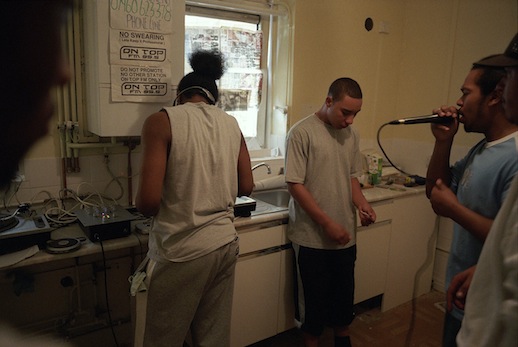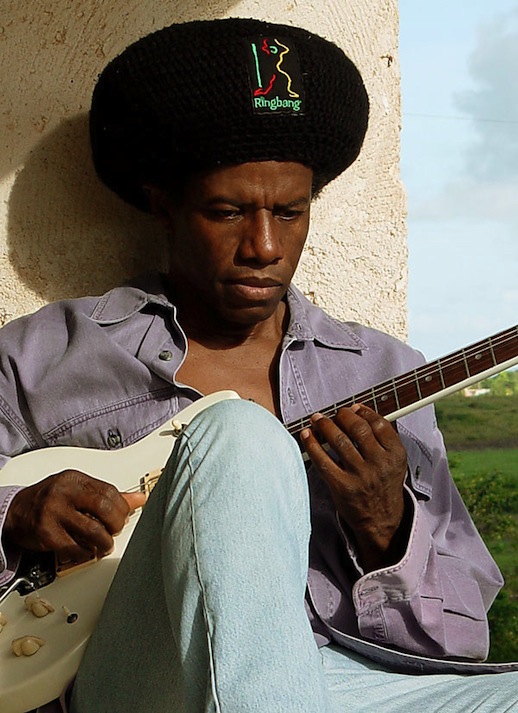 The glamour of the London pirate radio scene, where broadcasting might have to stop if there’s washing-up to be done. Courtesy of Simon Wheatley
The glamour of the London pirate radio scene, where broadcasting might have to stop if there’s washing-up to be done. Courtesy of Simon Wheatley
Sounds Like London
by Lloyd Bradley (Serpent’s Tail, 432pp, paperback)
Review by Kevin Pearce.
In Sounds Like London Lloyd Bradley zooms through the story of black music in the metropolis in a little over 400 pages. There is a trend towards tomes that are panoramic sweeps like this. From a publisher’s promotional perspective this may make sense, but for a writer it must create crazy crises and challenges. Lloyd will be more aware than anyone that every single one of his 400 pages has a specific theme that could generate a 400-page book, so what to omit and what to concentrate on? Everyone familiar with this site will surely acknowledge and appreciate the important part played in the history of popular music by London and its black population. But among us there will be different degrees of knowledge and specific areas of interest. So, there is also the question of how to pitch a book like this without alienating anyone and everyone.
There will surely be column inches devoted to Lloyd’s credentials, identifying why he is the right person to tell this story. It is quite likely that his peers have been telling him for years he would be the perfect candidate to write a book about black music in the UK. Being the anointed annotator can be a daunting thing though, and if everyone is telling you to do something the temptation is to turn and walk away. But Lloyd took on the task, loosened his collar, rolled up his sleeves, and got stuck in. Has he succeeded though? Oh yes.
Sounds Like London is a riveting read. It’s one to wolf down in a few sessions, and then savour slowly at a more considered pace. In an age when music titles from major publishers are judged more for their hurlability (“how far can I throw this one in disgust?”) than for their re-readability, Lloyd has done very well indeed. His tone is chatty, easy, light and breezy. That’s a trick that’s harder to pull off than might be imagined. A lot of writers would come up with something dry, dusty and awkwardly academic. A lot of publishers would present us with something that insults our intelligence. So to have a book that’s engrossing, engaging, entertaining and enlightening seems a real treat.
 Eddy Grant relaxing on the veranda of his Barbados villa
Eddy Grant relaxing on the veranda of his Barbados villa
Lloyd humbly states how lucky he was to have some great guides to steer the story, but these pilots are perfectly picked. He avoids trotting out the usual suspects who pop up perennially as talking heads as part of the dumbing-down documentary epidemic, so the stories and angles seem fresher than might be anticipated. Quite correctly, Eddy Grant is right at the heart of Lloyd’s history lesson, and it is wonderful to read a book that recognises his role in changing pop music forever. But some of the other choices of, well, witnesses are also inspired. People like Wookie, Root Jackson, Hazel Miller of Ogun Records, Teddy Osei of Osibisa, and Soul II Soul’s designer Derek Yates come across particularly well and have some great tales to tell.
The approach is to take specific scenes and areas of activity and focus on these. The account of what could be called pre-pop black musical enterprise is particularly important. The tangled lineage of London’s post-WW1 immigrant jazz, calypso, highlife and steel pan music, the singers and players, the clubs and labels is fascinating, and will be of particular interest to anyone enchanted by the old Honest Jons series London Is The Place For Me. Similarly there is healthy coverage of the fresh impetus brought to the London jazz and progressive rock scenes in the 1960s by Chris McGregor and his fellow South African exiles and by a number of West African musicians who started experimenting with wonderful hybrids of styles and sounds.
When the book reaches the more familiar black popular musical forms, Lloyd plays his ace cards. His report on the reggae scene dwells almost exclusively on the lovers rock “cottage industry” in a way that will help any reader understand why this was one of the great 20th century art forms. And his chapter on the development of the homegrown funk scene surely reveals a certain amount of insider’s knowledge. A wistful sigh is almost audible as Lloyd describes a Friday afternoon hanging around in the Contempo shop on Hanway Street, waiting for that week’s supply of soul and funk imports to arrive.
The description of difficulties young black kids had getting in to some venues hosting funk and soul nights is a stark reminder of the weightier issues underpinning this book. The approach to this must have been very carefully considered, and the political/social/moral injustices are tackled in a subtle way. Lloyd does not shove the subject down the reader’s throat. The effect of this is that when issues of discrimination, immigration, integration, and identity are raised the impact is so much more striking. And Lloyd again avoids certain clichés about disorder and protest songs. Instead he brilliantly pinpoints the beautiful lovers rock classic Black Pride, recorded by Brown Sugar, as the song that best captures or celebrates what it was to be a young black Londoner at the end of the 1970s.
So Lloyd wends his way through the story and reaches what could be called the modern minefield: “How far do you go? Things move so quickly now.” He manoeuvres neatly through the jungle explosion, that vital burst of creativity and DIY bloody-mindedness, gets to garage, dubstep and grime, and ponders the takeover of the pop firmament by Dizzee, Wiley, Tiny Tempah, Labrinth, etc., ending on a very positive note. Is this justified? Why not? After all, your mum is far more likely to know who Dizzee Rascal is than she is to recognise a Mumfords song.
And that London something? Well, again, without bludgeoning the point unnecessarily, the book does successfully celebrate the fact that black people in London have, one way and another, often very much against the odds and occasionally accidentally, for a century-or-so pioneered some of the most remarkable musical forms and movements ever experienced in the arts. A certain amount of black pride in that achievement is warranted, to say the very least, because we do have a horrible habit of being a bit sniffy about music made at home. Perhaps if there is one consistent thread through the book it is the way any form of black music in London is given a particular or peculiar twist.
Books of this nature tend to provoke two default critical positions. One response is to blithely accept anything in an admired book as the gospel truth, which is dangerous as there is never anything that could be called definitive. The other reaction is to quibble and cavil: “Yeah, but …” or “Where’s so-and-so then?” That is tempting, but simply depressing. Of course there is a lot missing from Sounds Like London. There may be things that are wrong. And, yes, there are another 400 books to be written about the themes it touches on. But if someone picks up Lloyd of London’s book because it has Dizzee Rascal on the front, and that person is later intrigued enough to look up a Shut Up and Dance clip, a Janet Kay song, or a Cymande track on YouTube then that’s what it is all about. In the meantime, it seems too good to be true to have a book that mentions Marie Bryant, 32nd Turn Off, Denis Preston, Sandra Cross and the Ragga Twins as if it’s the most natural thing in the world.
Sounds Like London is this week’s Book of the Week on BBC R4. Listen HERE.
Buy the book from Rough Trade.
Sounds Like London.